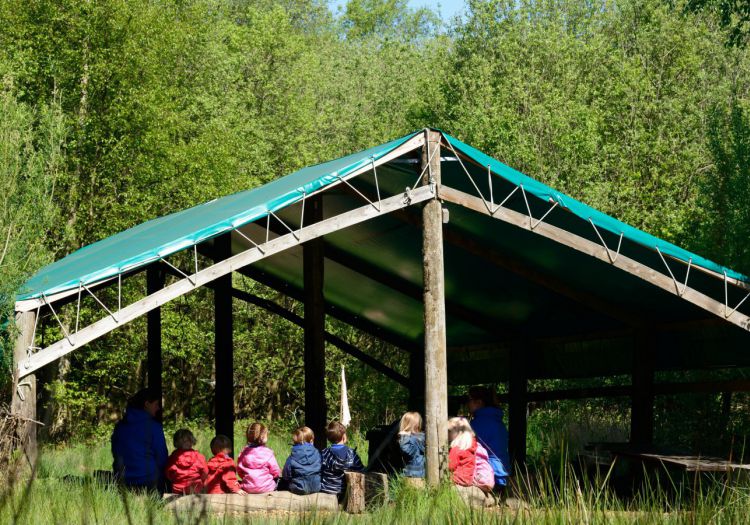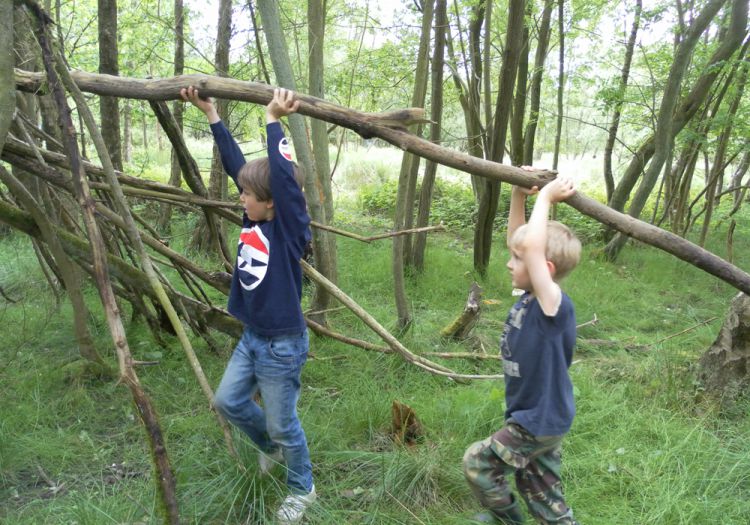School Trips
Forest School and Farm Trips
We have three types of trips, Forest School tasters, environmental education and farm sessions. We plan half day sessions, a full day trip can be made up from a mixture of different types of trips.
Our Forest School trips are based in one of our purposefully developed Forest School base camps. Our Environmental Education trips are a great way for a whole class to learn hands on about our countryside. For farm education trips we can offer annually up to 25 two hour trips to schools, which are funded from the government, through the Countryside Stewardship Mid Tier Scheme (CSMT).
Background Infromation
In February 2009 we set up a Forest School with our nursery, and now have 11 qualified Forest School Level 3 Leaders delivering Forest School to all ages across the nursery on a regular basis. Four of our Forest School Leaders; Kate Robinson, Robert Marlow, Louise Lambord and Joe Hornblow specialise in Forest School with primary school children and lead working with primary schools and local colleges.
Kate Robinson has a background of a BSc in Countryside Management and began her career by leading outdoor education trips for residential or day learning trips in a field studies centre. On returning to Great Wood Farm Kate completed her post graduate course in Early years Professional Status and Forest School Level 3 Leader Award and set up the Forest School. Robert Marlow has a scouting background and has been a Forest School Leader for many years, he helps coordinate Forest School at Great Wood Farm and leads our holiday club as well as many school trips a year. Louise Lambord is a qualified teacher and has been delivering Forest School in primary schools in Shropshire for ten years, before moving to Lincolnshire and working at GreaT Wood Farm in Janurary 2024. Joe Hornblow has a conservation science background and has a wealth of knowledge about the natural world and is currently completing his forest school level training.
Our woodland sessions are either based in our own 'Farmer Brian's Wood' base camp or in one of our base camps in Boothby Great Wood, owned by Forest England. The location of the trip is dependent upon the session chosen and which base camp is best for the chosen activities.
Here at Great Wood Farm we offer a variety of trips to suit your needs:
Forest School Trips
Forest School is aimed to be a programme over a few consecutive weeks and through this achieves deep level learning and the active learning style helps to improve behaviour, concentration and develops a child’s emotional intelligence. A Forest School taster session will give an insight in what can be achieved and how it benefits the children. There is also the option for an added extra to book in for lunch cooked over a fire in our Forest School base camp.
Environmental Education Trips
These trips develop children’s knowledge and understanding of the world through a captivating hands on approach.
Farm Government Funded Trips
These trips are part of the Countryside Stewardship Mid Tier Scheme We have 25 free trips a year available to groups. Groups can be school parties wanting to learn about food production, farming, wildlife conservation, landscape and historical features. Each visit will last for two hours and can be arranged for a morning or afternoon.
We plan all of our school trips sessions for 2 hours for a half day trip, a full day trip can be made with a combination of two sessions from the above three types of trips. The following topics are options we can offer:
|
Theme |
Activities which can be included (not all can happen in one session, they will be tweaked for the age group) |
|
Woodland Habitats |
Seasonal nature walk, identify plants and animals using magnifying glasses and ID keys to match up footprints and so forth, build habitats for a woodland soft toy animal Explore age appropriate science language, e.g. adaptation, food webs and chains |
|
Classification/ Identification of either trees, flowers/plants, food chains/webs
|
Minibeasts: Minibeast hunting using magnifying glasses and collection pots, explore using ID keys to identify them, observational drawings using charcoal Trees, Glorious Trees: transient art from collected natural materials, leaf hammering, tree identification and classification activity Grassland / Wild flower habitats: transient art, nature walk, identification and classification challenges, explore structure of a plant Food chains: explore owl pellets with tweezers and identification sheets, large scale fabric food chains with sticks and a basket of props and words to sort |
|
Lambing 6-21st March 2025 |
Learn about lambing time on a farm, walk around farmyard, seeing the lambs with their mothers and discover the work a farmer has to do, if there is a cade lamb (without a mother), help bottle feed it, craft activity with sheep’s wool, tractor and trailer ride (weather dependent)
|
| Stone Age |
Children can spend a day surviving in the woods during the Stone Age! Children will learn what is needed to survive. They will be able to whittle a stick using flints and make bread dough, which they will then cook over the fire using the stick they had whittled. Children will be able to try using a genuine Quern grinding stone to grind wheat to make their own flour, which was discovered in a quarry and dates back to the Stone Age. To extend to a full day, children can head to a different base camp using waymarkers along the way, where they can spend the afternoon building shelters in small tribes and have a go at making a wattle and daub wall. |
|
Sounds |
Make a musical instrument from natural materials, join together to make a band, distance games, explore sounds on trees Find a magic spot, listen to the sounds and draw the origin of the sound on a paper plate, on the side the sound is coming from. |
|
Shelter Building |
Discuss what is needed to survive outside, considering hierarchy of survival needs. In teams build a shelter using a tarpaulin and natural materials. The session will be concluded by each group presenting their shelter to the rest of the group and they will be scored for their level of robustness, protection from the elements and team working skills. |
|
Creativity Outdoors - Clay - Charcoal - Potential of a stick - Watercolour painting |
Clay: Storytelling through the use of creating clay creatures or decorations, children will begin by planning a story board in small groups, before creating their characters and then renacting the story to finish. Charcoal: Make our own charcoal by whittling bark off willow sticks. Sticks are then placed in a tin over a fire, when done, children can use the charcoal to make a special drawing. Children learn how to use a knife and build a fire, following our safety rules. Potential of a stick: Encourage children to come out with their own ideas in how they could use a stick. Following activities available - mark making with sticks with mud, make streamers on sticks, build a human body out of sticks, tools can be available to support with whittling Watercolour painting of a farm landscape |
|
Fairies and Goblins |
Tell a story about the fairies and goblins living in the woods and how the fat bottomed dragon came and squashed their village, how could we help? Encourage children to design and make gifts to leave for them and share them with the group at the end. |
|
Food to Fork Outdoor Cooking - Healthy Diet - Seasonality - Techniques - Little Red Hen - Crops/Harvest |
Build a fire following our fire safety rules and cook from a range of items: - Wild foraging and make nettle soup (Spring/early summer) - Blackberry pancakes (September) - Doughnuts - Baking bread Little Red Hen: Bring the story to life on Forest School, puppets available to support reinacting the story, children can individually make their own bread dough and bake over a fire on a stick to make a bread cup Crops: Tractor and trailer ride around the farm (as long as good ground conditions) to explore the farming calendar with the varying processes from drilling the seed to combining the crops. Look closely at the roots and different parts of the plants. On return to the farmyard, grind corn to make flour and finish with a plan a farm craft activity (varied for different ages). |
|
Tools - Bows and arrows - Whittling - Catapults - Wood Cookies - Games |
Bows and arrows: Use knives and loppers to create bows and arrows, children can work together to make a target area Whittling: Can be used for range of purposes to whittle a stick to make a spoon, toast a marshmallow, artwork Catapults: learn how to use tools to create catapults Wood cookies: use bow saws or loppers to make a key ring, coaster or for noughts and crosses, charcoal available for mark making Games: children can design their own games |
|
Compass and Map Reading |
Route of the Navigator: learn how to read a compass and map before heading off in small groups to follow a route, being guided by clues on a sheet and a compass and map. Add features discovered onto the map along the way |
|
Competitive games Outdoor adventurous challenges/team building games |
Capture the flag game where children are in two teams, the build their den and flag first, decide upon their team tactics ready for the game to begin - which team will capture the other teams flag first - encourage children to reflect and decide rules Other games can include: - Create shapes in rope, which team will create different shapes first without everyone not letting go of the place on the rope - Bat and Moth game, exploring echo location in a fun way |
|
Bespoke maths |
We can create a bespoke maths session, (for an additional £1 per child). These sessions can help children make accelerated progress through outdoor learning, a captivating learning environment. Examples could include fractions using natural materials, transient art symmetry, 2D.3D shapes created using sticks and tying with string |
All of these sessions are planned by Kate Robinson (Early Years Professional Status) along with her sister who has QTS and works in a local primary school.


